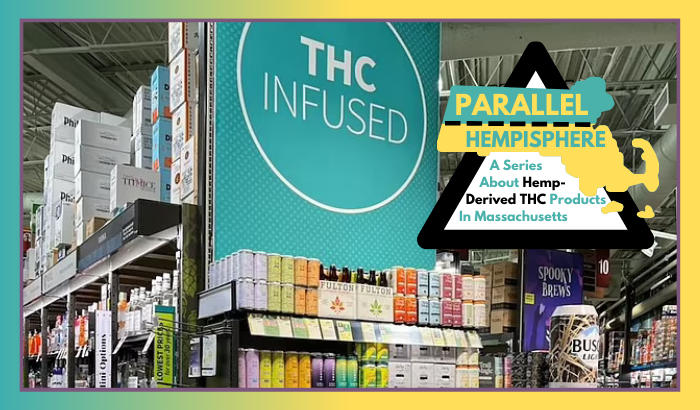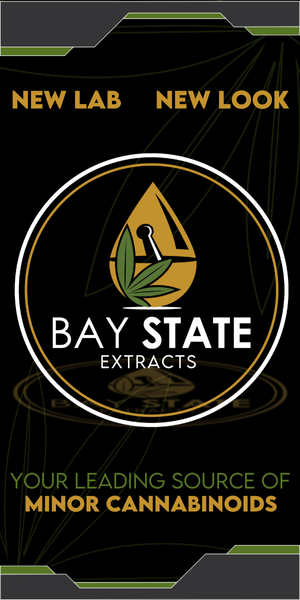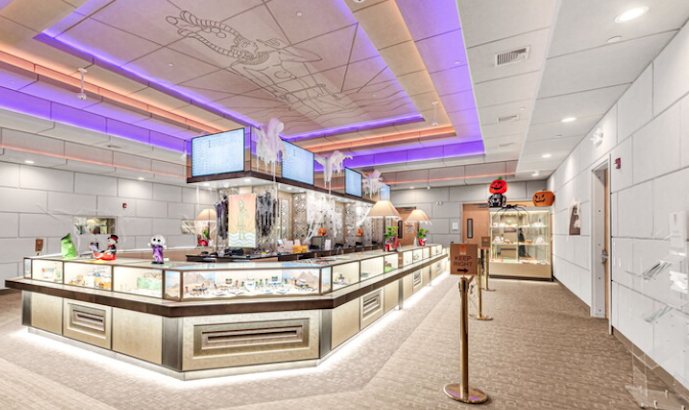
“As more people get access to hemp products, it will naturally drive people into dispensaries. Responsible hemp companies are fine with additional taxation and rules to ensure the products on the market are safe.”
By Dana Forsythe
with additional reporting and editing by Chris Faraone
Of the issues that are sure to summon debate throughout 2024, hemp-derived synthetic cannabinoids—and untold intersecting science, commerce, health, and legal hot potatoes—may prompt the most clamor. Our team at Talking Joints Memo enlisted ace culture reporter Dana Forsythe to help us survey the landscape and speak with stakeholders and experts to produce a series that untangles the topic. This fifth of five installments is about companies in search of compromise. And profits. -TJM Editors
←Click here to go back to Part 4
When Talking Joints Memo interviewed Josh Grab last September, the president of HighTide was riding on the waves of a successful launch. Following his company’s release of THC-infused margaritas in May, it seemed like the pastel cans were everywhere last summer. Sitting at a coffee shop on the South Shore, he beamed, “The support we have gotten from retailers and drinkers has been overwhelming.”
At the same time, Grab expressed some consternation about how challenging the drink market can be. For starters, cans take up a lot of space, which often means that small and typically urban dispensaries can’t carry a lot of them due to Massachusetts Cannabis Control Commission regulations that require products to be locked in a vault. There’s also a potency issue; while some products like Chill Medicated are now offering much higher doses on the adult-use side by calling their liquids syrups, mixes, or concentrates, classic canned sodas, seltzers, and mocktails like HighTide are limited to a mere 5mg a can.

Already balancing those difficulties in a volatile industry, Grab was caught off guard when beer distributors in New England began quietly moving hemp beverages that get you stoned—undercutting medical and recreational cannabis dispensaries, and bypassing state regulations. Trucked in from out of state and sold at bars and liquor stores, the drinks are mostly infused with synthetic delta-9 THC. And since the 2018 US Agriculture Improvement Act (aka the Farm Bill) legalized the hemp and hemp extracts used to make these products, it’s all basically legal. If you’re just noticing it now, that’s because Mass was late to the party.
Fortunately for Grab, HighTide is nimble; instead of building out their own facility, they partnered with a licensed co-packer. Also, he comes from a beer and spirits background, having learned the ropes of product marketing and distribution over several years of selling Sam Adams for Boston Beer Company. While a lot of Massachusetts cannabis license holders are upset—some angry enough about competition from hemp companies that they plan on proposing statewide legislation that would impose severe penalties on anyone caught selling synthetics outside of the sanctioned system—his crew is diving in with HighTide while the tide is still high.
Grab’s business partner Shea Coakley said that for several years they’ve watched the infused beverage scene closely in Minnesota, which was the first to lean into hemp drinks that get you high after the passage of the Farm Bill. Recently, Coakley, like others keeping tabs, took particular notice of a landmark case in New York. Last November, the Empire State’s Supreme Court ruled in favor of the hemp companies that NY’s Cannabis Control Board tried to put out of business via so-called “emergency regulations” last July. Their claim: there was a crisis afoot. The ruling: not so much. The court essentially told regulators that they had the chance to rein in hemp sales, but passed up the opportunity and, as a result, “Absent regulations in New York governing the THC content of cannabinoid hemp products, such products were, by default, controlled by the federal Farm Bill requirement that the products’ THC content not exceed 0.3% by weight.”

The NY supremes also provided a safety endorsement: “The Emergency Justification fails to cite evidence or studies to substantiate that New Yorkers have either been misled or harmed by hemp infused products [and] fails to cite facts showing New Yorkers have either overconsumed or accidentally ingested intoxicating levels of THC.” The court dug in: “Likewise, the Emergency Justification’s parade of horribles that await children from petitioners’ products lack specific recital of any actual facts upon which such concerns are based.”
Precedents from New York and other states considered, every hemp biz stakeholder asked to comment for this story said something to the point that their industry is looking for more state-by-state coherence.
“The federal law is clear, but states are still figuring out the details of how they want to regulate the space,” Coakley said. “Across the board, I think brands like HighTide are looking for a more definitive response and plan to THC beverages on the state level. I also understand that this is new and sometimes things take time.”
Soon, likely this spring and roughly a year after their natural THC drinks first landed, Coakley said the company will release a delta-9 product. “We will be available through eight-plus distro houses across the country and online via direct to consumer,” he said. “We have assembled a world-class team from the bev alc and [consumer packaged goods] spaces with plans on becoming a nationally recognized name in the space.”
Some brands are already working both sides of the game in Massachusetts. Cann launched in 2018 to sell “social tonics.” A Harvard Business Review case study found that by 2022, “the company had several notable celebrity investors and talent partners, had sold over 10 million beverages to consumers, was distributing in six states and two Canadian provinces, and had closed on a $27 million Series A funding round.” That was before things took off; now, while the cannabis version of Cann is only in dispensaries in six states (including Mass), they’re shipping hemp-derived delta-9 drinks to 43 states and Canada, and distributing them to retailers in lots of those places too.

Adam Terry launched Cantrip in 2021. Before that, he started working in Massachusetts cannabis in 2017, for Temescal Wellness, and had big aspirations for his own beverage brand in the adult-use market. But after slugging it out for two years, his team scrapped that plan and linked with a co-packer in Minnesota to exclusively make hemp-derived delta-9 drinks. They now ship nationwide, have cans in liquor stores in Mass and other states, and even have their products placed in prime positions in national chains.
“We don’t produce for dispensaries anymore,” Terry said. “We’ve been in over a hundred dispensaries in [Massachusetts] and we used to do these pop-up tastings and the number one question I got was, Why is this limited to only 5mg? … There are a lot of difficult economics there, but this is a two-sided issue in the sense that the cannabis dispensary model should not be advocating to shut down hemp beverages on the beer and wine side, they should be advocating to get more milligrams in the cans they sell at dispensaries. They should be able to sell a 50 mg or 100 mg [drink].”
Jason Reposa founded Good Feels, an independent Mass-based beverage and tincture company, in 2020. An ally to hemp-based brands and member of the Hemp Beverage Alliance even though he’s yet to take the leap himself, he said the CCC should change rules on the adult-use side to allow multi-serving beverages and stronger edibles. His business built its reputation on reliable 5mg products and is now focused on high-dose tinctures, yet he sees the influx of new products that are outside of state regulator purview—especially modestly-dosed beverages—as a good thing.
“Lots of casual consumers will never enter a dispensary are finally able to get access,” Reposa said. “As more people get access to hemp products, it will naturally drive people into dispensaries. In addition, responsible hemp companies are fine with additional taxation and rules to ensure the products on the market are safe.”
Christopher Lackner, the executive director of the national Hemp Beverage Alliance, said, “Unlike a lot of the products that you’ll find at a dispensary, which are vessels for the [THC] molecule, these beverages are a completely different experience in the sense that you’re looking at flavor and that it’s something in your hand at a party. And this is something that is sessionable—these are [customers] who are looking for a low-dose amusement rather than getting stoned.”

For those who do reach for hemp-derived refreshments where they’re available, there will even soon be infused ice to drop into their marijuana mocktails. Harry Groome, the owner of Highdration Kitchen which currently manufactures Melt cubes with a CCC-licensed co-packer, is also taking the plunge.
“The reality is folks are not flocking to dispensaries to buy beverages,” Groome told Talking Joints Memo. “Oftentimes, Melt is displayed next to glass and vape products. With a [delta-9] THC product, we will be next to the beverage fridges and will feature grab-and-go displays at checkout in supermarkets, [convenience] stores, and liquor stores. We will be entering the market shortly and are in discussions with beverage and [delta-9] companies with established sales and distribution channels.”
He continued, “Due to the financial and marketing restrictions and lack of opportunity to quickly scale in the Massachusetts regulated market, we have no choice but to focus on bringing Melt into the legal [hemp-derived] space.”
Thank you for reading Parallel Hempishere. This is not the end of our reporting on hemp products, but rather more like a new start with clearer eyes and more perspective. We appreciate everyone who gave their time to explain these complicated issues to us, and we hope that communication continues. Our team worked hard to report this story accurately while including various aspects and critical tangents and viewpoints, and encourage readers to contact us with any questions, corrections, and information that could be useful in updating this series and informing future coverage. You can email us at info@talkingjointsmemo.com. –TJM Editors
























